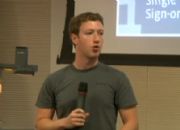In an interview at the Web 2.0 Summit in San Francisco last year, Facebook CEO Mark Zuckerberg acknowledged that he has made a lot of mistakes with his company over the years. In response to a question from the audience about being a young entrepreneur, Zuckerberg said: "Oh man, I've made so many mistakes running a company so far. If you can think of a mistake, I've probably made it or will in the next few years."
"The Facebook story is an example of if you're building a product that people love, you can make a lot of mistakes," Zuckerberg added.
Here's a brief history of Facebook's most notable flips and flops. Let's start in 2011 and work our way back.
Giving It Up to Developers
Flip: You know that screen that pops up the first time you play a game like FarmVille? The one that asks you if it's okay to give some of your personal data to the developer? Facebook announced on January 14 that it would be giving its developer partners the right to capture your home address and mobile phone number if you say yes at the bottom of that permissions box. The same permissions window pops up when you use your Facebook ID to log in to a third-party Website for the first time, so Facebook's many Facebook ID partners could have a shot at the data, too.
Flop: After hearing complaints, Facebook reversed its decision to serve up home addresses and phone numbers to developers and partner sites. "Over the weekend, we got some useful feedback that we could make people more clearly aware of when they are granting access to [their home address and mobile phone number]," Facebook said in a blog post on January 17. "We agree, and we are making changes to help ensure you only share this information when you intend to do so. ... We look forward to re-enabling this improved feature in the next few weeks."
Jousting With the Germans
Flip: In August 2010, Hamburg's Data Collection Authority questioned Facebook's use of the e-mail addresses of non-Facebook users who were invited to join the site as part of Facebook's Friend Finder feature. Not only did those people not know how Facebook got their e-mail addresses, but it was unclear how Facebook would use the addresses once they were in the Facebook servers. Would Facebook hand them over to partners? Or would it just continue to pester the owners of the e-mail addresses to join Facebook?
Flop: Facebook reached an agreement January 25 with Germany in which it backed off--somewhat. Facebook said that it would give the non-Facebook users a chance to opt out of further invitations to join Facebook. The company also said that it would explain to the owners of the e-mail addresses why they were being contacted. Facebook did not agree to stop capturing and keeping the e-mail addresses, however, and it became clear that Germany would have to sue to make that happen.
Still More Data Made Public
Facebook insisted that making the data public would make Facebook a more social community and would ultimately benefit users. The reality, of course, was that Facebook--a free service--had simply raised the cost of using the site, not by asking for users' money but by asking for more data that the company could share with its advertising clients and partner sites.
Flop: After a noisy backlash, Facebook announced that it would overhaul its privacy settings. During a May 2010 press conference at Facebook headquarters in Palo Alto, California, CEO Zuckerberg said that Facebook had radically simplified its privacy changes: The previous 50 privacy settings were reduced to fewer than 15, and the number of sections in the privacy settings was consolidated from ten settings on three pages to seven settings on one page. In the end, the widened set of public data remained intact.
Privacy Changes Make More Data Public
Flip: In November 2009, Facebook decided to update its privacy settings, ostensibly to make them simpler and more user-friendly. The changes included the ability to assign certain privacy settings on a post-by-post basis.
But as is often the case with changes in terms of service that Facebook announces as being benevolent to users, the revised policy offered a big benefit to Facebook as well. Here's what the Electronic Freedom Foundation had to say about the revisions, in a December 2009 blog post: "These new "privacy" changes are clearly intended to push Facebook users to publicly share even more information than before. Even worse, the changes will actually reduce the amount of control that users have over some of their personal data."
Specifically, the new privacy controls set many key personal data points--including the user's list of friends--to "public" by default, meaning that thenceforth anybody could view the data. The changes also completely removed the users' option to keep private their gender, their hometown, and the names of pages that they had become a fan of.
Flop: Facebook again relented only somewhat, reinstating a privacy control that hid friend lists on users' profile pages.The friend lists remained fair game for applications developers, however.









